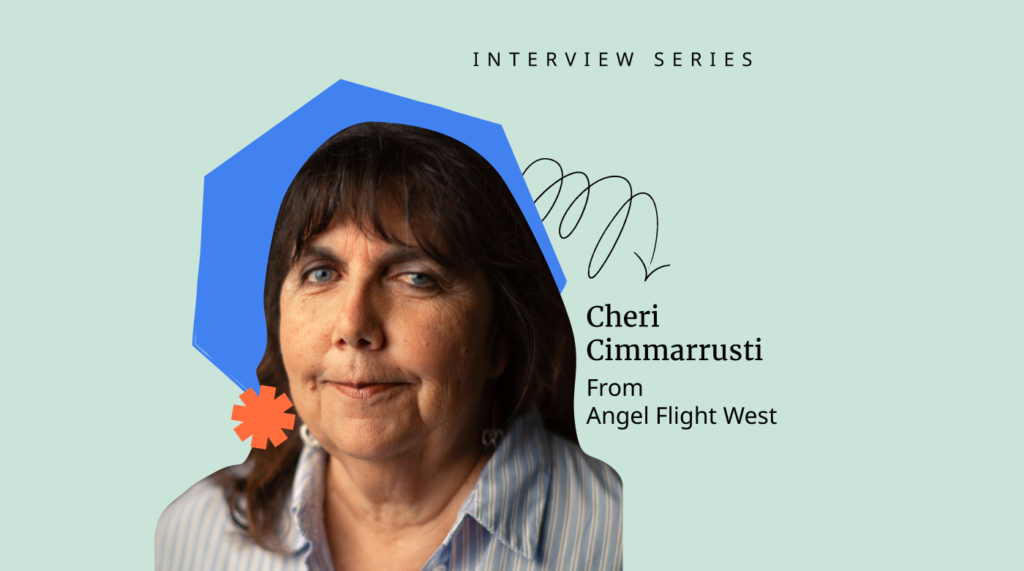We’re passionate about the world of work, and how we can make it better. To help satisfy our curiosity, we’ve launched an interview series where we pick the brains of experienced leaders, business owners, managers, and individual contributors to get their thoughts on how we can collectively build better workplaces.
We’d love to get to know you a bit better, tell us a bit about your backstory.
I was experiencing empty nest syndrome after my two children were grown and out of the house. In my search for something meaningful to get involved in part-time, I came across an ad for a 12-hour-a-week job as the Assistant Mission Coordinator with Angel Flight West. Two years later, I was promoted to the Lead Mission Coordinator position. The rest, they say, is history. What started out as a time-filler for empty nest syndrome has been my career for the past 25 years. I am now the Associate Executive Director with Angel Flight West. This organization has allowed me to cross paths with passengers, colleagues, volunteers, board members, and others who have guided me, inspired me and made a permanent impression on my life.
If we were to ask a friend to describe your personality to us, what would they say?

I’m sure friends and colleagues alike would say I was compassionate, outgoing, and a people person. As a little girl, I always dreamt of becoming a nurse. That desire to care for others never went away. Angel Flight West has given me the opportunity to help others in a way I never thought possible.
Thinking back to your career journey, what’s an interesting story that stands out?
Funny enough, I didn’t get the job when I first applied to be the Assistant Mission Coordinator. They hired someone else. Three weeks later, the candidate didn’t work out and I was hired. Things don’t always work out the way you expect, but they do work out. It can take time for all the right cards to fall into place.
What’s the most impactful lesson you've learned over your career thus far?
Little else matters without self-confidence.
Because of the support from colleagues, managers, volunteer pilots, and board members, I’ve learned to believe in myself. Learning to be confident in the workforce is an acquired skill—a skill that I gained because of people who have been champions for me. When my kids were young, I acted as PTA president, and I was involved with the little league board, but I was never in the workforce as our general contracting business operated out of our home. I’ve grown personally and professionally through my career with Angel Flight West.
Thanks for giving us some insight into who you are! Let’s jump into things. When you hear the phrase “build a better world of work”, what comes to mind?
The first two words that come to mind are camaraderie and trust. You must be able to trust the people you’re working alongside—trust that they can do the job and hope that they trust you to do your job. I also believe that compassion is a critical quality for any leader to possess. My team has said that my caring nature is a benefit of working with me.
They know they have permission to fail; we’re all human and we all make mistakes. We learn from it, and we move on.
For you, what’s the main blocker you see as standing in the way of building a better world of work?
To expand on the previous question, a team without the qualities of camaraderie, trust, and compassion is unlikely to make for an optimal work environment.
Most people can learn the skills needed to succeed in a role, but these qualities are difficult to teach.
Luckily, I haven’t had a lot of blocks or walls in my career. We spend so much time with our colleagues; it’s critical that they feel heard, safe, and cared for.
What’s one thing within our control that we can practically do to build a better world of work today? And, how do you recommend going about it?
When we invest in our employees, we motivate them to invest back into the organization. We ask for a lot from our team, but we also give a lot of support. I think this has allowed us to create a culture of devoted team members who truly care about the organization and each other. It’s critical that management create a safe, nurturing, and fun atmosphere—a place where they can produce quality work.
We need to recognize and foster employee talent by providing resources for them to succeed, be it through continuing education, employee coaching, or through other means of support.

At Angel Flight West, we are working each day to help patients access their long-distance health care, and we need (and have) a team that will do everything possible to make those missions possible.
Specific steps that people can take to invest in their own employees and make them feel valued is to build up their employees during their onboarding process. Work towards learning each new employee's strengths and make sure to find tasks and assignments where they will shine. Then, make it a conscious effort to support the strengths of the employee through their term. During our all-staff meetings, we like to share the progress the team is making. It's important to us to bring public recognition to our employees and their hard work. We encourage employers to point out specific team members when they have done something above and beyond—keeping in mind that everyone should get that special recognition. When you have a staff that is as productive and fun to work with as ours is—make sure to praise them to others as well—new contacts, Board of Directors, etc.
I also want to encourage employers to encourage professional growth within their employees. Remind team members that you want them to stay and grow along with the business and/or organization. Ways that employers can encourage professional growth within their employees are by offering ongoing education, online courses and workshops, and/or personal coaching—particularly when someone moves into a new role.
It is also important to ensure that employees still have time together, even in a virtual workplace. Find ways to bring the team together to enhance camaraderie. During our team meetings, we always make sure to take care of all of our necessary updates, information sharing, and other day-to-day tasks - but I also always do my best to include a little banter, chatter, or water cooler talk. This not only helps reduce stress when times are busy, but it helps us get to know each other better.
Last but not least, make sure team members are always updated with new information. Knowledge is power. It's never fun to be an employee who doesn't know what's happening or going on within the organization.
Can you share one thing you’ve experienced, seen, or read about that is leading us towards a better world of work?
A lot has changed since my 25 years at Angel Flight West. While I sometimes miss the days of doing everything manually, I can’t deny that technology has allowed us to further our mission. We’re a small team. It’s critical that we use tools and technology that helps us become more productive to serve as many passengers as possible. Because of changes in operating systems, we can focus on what’s most important—our passengers and patients who need our services.
I’m curious, thinking about building a better world of work, is there a company and/or leader who stands out to you as someone we should follow? If so, what are they up to?
Board members with Angel Fight West play a truly meaningful role. They dedicate their time to help fulfill our mission while helping to fundraise and fly missions for passengers in need. They also support our small team of staff members in incredible ways. Two specific leaders stick out to me: Paul Jacobs and Warren Wood. They both have been supporters of Angel Flight West for decades.
How can our readers follow your work?
Readers can learn more about Angel Flight West at angelflightwest.org.
Thank you for adding your voice to People Managing People’s interview series on How to Build a Better World of Work!
Add your voice to the conversation
Join our interview series and share your ideas for how we can build a better world of work!

